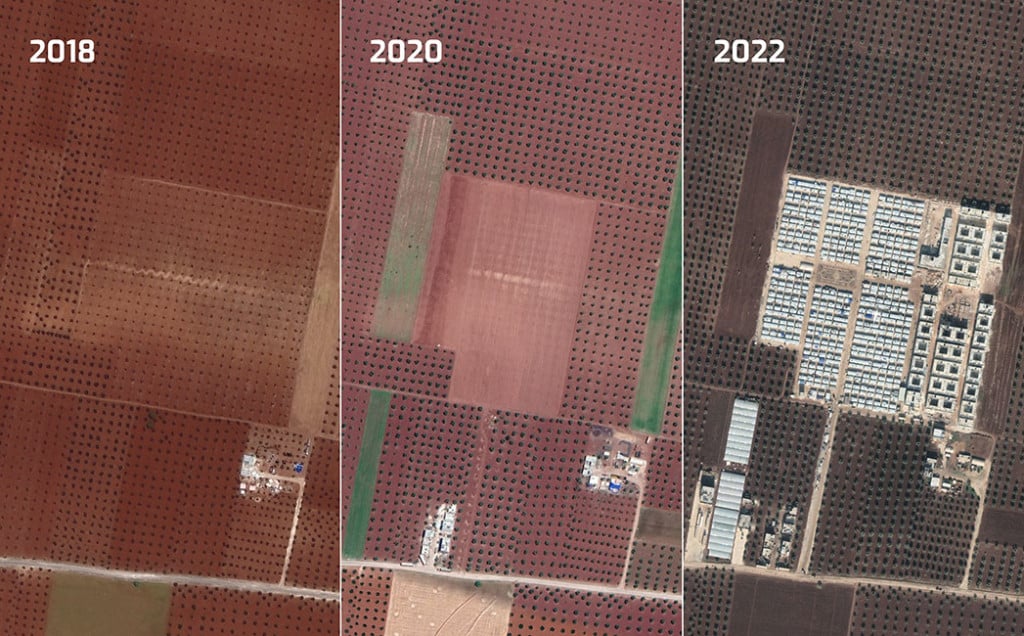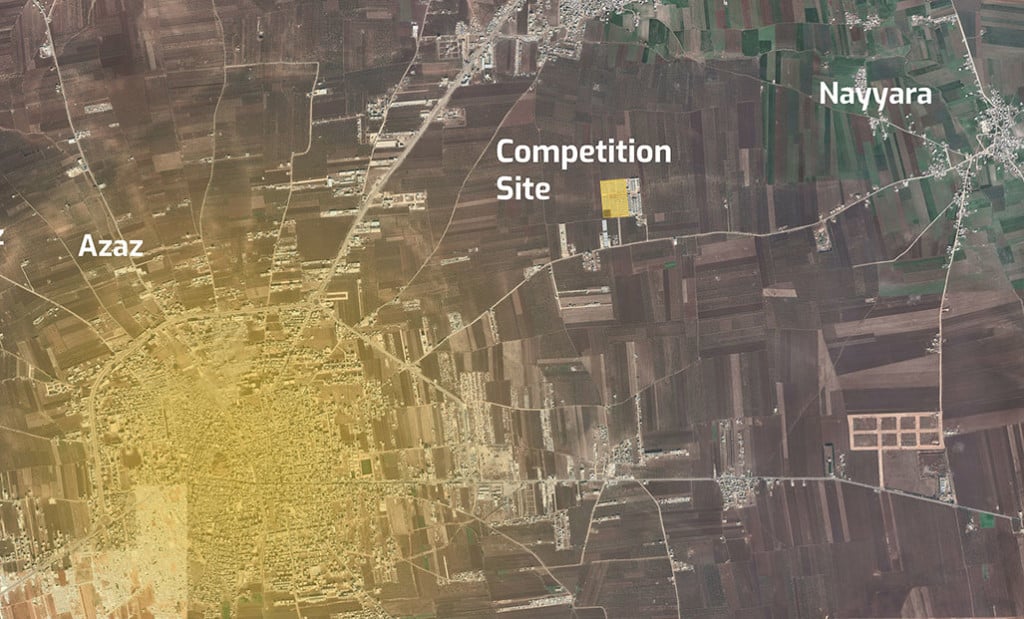2024
Architects For Humanity
An International Architectural Competition
to redesign a Housing Quarter for
Earthquake
Victims in Northern Syria
Total Awards: 4500$ + Implementation possibility
Architects for Humanity

This competition is part of a strategic partnership between Mimaria Studio and Molham Team that aims to design innovative, sustainable, and culturally sensitive housing solutions for the earthquake victims of Syria.
Introduction:

History of Azaz; Northwestern Syria:
Azaz has been a critical place for many empires and civilizations, as a vital fortress town and a main battleground during different periods. After Syria gained independence in 1946, Azaz became the center of its district.
During the Syrian Conflict, Azaz became a stable place in the middle of chaos. This stability has brought many NGOs to the area to start housing projects, giving shelter and help to those affected by the conflict. Its secure setting and location near the Turkish border make Azaz an excellent place for carrying out these projects. NGOs see the need for long-lasting housing solutions and have chosen Azaz as a central point for their work. As a hub for these projects, Azaz is providing a safe place, aiming to bring back stability, community, and hope to those who have lost their homes.
However, the earthquake severely tested Azaz’s resilience on February 6, 2023. The tremors devastated the city, collapsing buildings and leaving many without shelter amidst the cold and rain. Despite the challenges, the spirit of the community remains unbroken. This catastrophe has underscored the urgent need for stable, safe housing and support for the recovery efforts, bringing to light the incredible resilience and hope of the Azaz community even in the face of compounded disasters.

Challenge:
The Syrian conflict, now in its thirteen years, has resulted in one of the most significant displacements in recent history. Over 12.5 million people have been forced from their homes, leaving a vast majority in dire need of shelter, security, and a sense of belonging. The socio-cultural fabric of Syria has been deeply scarred, with buildings and infrastructure severely damaged. This crisis, compounded by the latest earthquake, has left millions homeless and eroded the essence of ‘dwelling’ – a space beyond the physical that fosters a sense of identity, community, and security.
1.City Challenges: Azaz faces overcrowding due to an influx of 2.9 million refugees. The emergency housing need has led to the repurposing agricultural land, posing risks to local food security and the environment. As a result of rapid development, the area’s natural environment and lack of public spaces have been negatively impacted.
2. IDP Challenges: The majority of IDPs live in harsh conditions with insufficient space and privacy, struggling to establish a new sense of belonging amid affordable housing shortages.
3. NGO Challenges: Despite being at the forefront of relief, NGOs face resource constraints and the challenge of rapidly building quality, low-cost housing.

Response:
We invite the international architectural community to rise to the challenge of designing innovative, sustainable, and culturally sensitive housing solutions for the earthquake and displaced victims of Syria. This competition seeks to address the complex crisis in Azaz by creating a new urban quarter that provides shelter and recreates a sense of home, community, and belonging.
. Design a Housing Complex: Participants are tasked with designing a housing complex that accommodates 450 families, incorporating cultural, commercial, educational, and public functions.
. Balance Social Responsibility and Community Diversity: The design must harmoniously balance social responsibility, community diversity, and vibrant public spaces, curating spaces that spark interactions and nurture a sense of community.
. Create Resilient and Adaptable Spaces: The design must be earthquake resilient and adaptable, considering future scenarios, changing community needs, and integrating public and private functions to foster a cohesive community fabric.
. Consider Cost Efficiency and Construction Feasibility: The design must be realistic, feasible, and cost-efficient, considering local resources, available skills, and budget constraints.

Design Program:
Criteria:
- Design:
Project evaluations will focus on four key areas: the design’s capacity to foster community interaction and connection; the incorporation of sustainable, energy-efficient practices and local materials; the promotion of personal connection and pride among residents; and the design’s resilience to climatic and seismic changes, ensuring durability and safety.
- Functionality:
Design adaptability to meet the community’s evolving needs will be crucial in the evaluation process. This includes the thoughtful planning of communal areas to encourage social integration and foster a sense of ownership. The organization and hierarchy of spaces will be assessed for clarity and usability, ensuring a smooth flow within the living environment. A key focus will also be maintaining a balanced approach to privacy, ensuring that individual needs are respected within the communal living setup. .
- Execution:
The evaluation will emphasize the scalability of designs, assessing their adaptability to various contexts. Cost efficiency will also be a key factor, focusing on economic construction methods that maintain quality. Furthermore, the feasibility of the designs will be judged based on their alignment with local resources, available skills, and budget constraints, ensuring practical and sustainable implementation.
Key dates:
- March 15, 2024
Competition launch - April 25, 2024
Deadline for Receiving Questions - May 2024
Molham Projects seminar - July 30, 2024
Registration deadline - July 31, 2024
Submission deadline - August 2024
Shortlist announcement - August 2024
Winner announcement
Registration fees:
Early Registration
Standard Registration
Late Registration
Early Registration
Students who qualify for the shortlist will receive a refund of their registration fee
Standard Registration
Students who qualify for the shortlist will receive a refund of their registration fee.
Late Registration
Institutional Registration
Prizes:
TOTAL PRIZE FUND
4,500 $
1ST PLACE
2,000 $
+
Implementation possibility
2ND PLACE
1,500 $
3RD PLACE
1,000 $
20 honourable mentions & certificates
Honorary certificates + published work in publications, our website, social media pages, and exhibitions..
Jury:
Jury members shall under no circumstances be contacted by competition participants or their representatives. Participants who attempt to contact jury members, shall be disqualified.

Architect & Head of Architectural Department at Molham Volunteering Team

Architect, Urbanist, & Researcher

Architect, CEO, & Cofounder of Molham Volunteering Team

Architect & Urbanist ,founder of design&more

Veteran Civil engineer & Head of Engineering Department at Molham Volunteering Team

Founder & Design Principal at Verform

Urban planner, Architect, & Academic Brandenburg University of Technology (BTU)
Questions?
For any inquiries regarding the competition brief, please contact us before the deadline:
Email: [email protected].
Deadline for Queries: 25 April 2024
